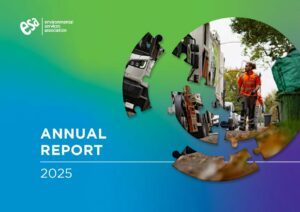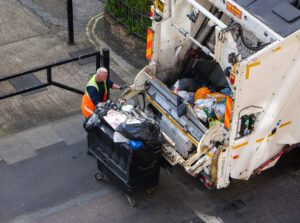A new study, published today (3rd December 2024) by the Environmental Services Association, has found that Energy-from-Waste plants fitted with carbon capture (CCS) technology offer the most reliable and lowest-carbon solution for treating residual waste in future, but that current policy trajectory could put investment in CCS at risk and undermine the waste hierarchy.
The independent report, which was authored by SLR Consulting, presents the findings of an appraisal of viable future residual waste treatment solutions on three grounds; cost, reliability and technological readiness, and carbon emissions performance.
The study found that, without further government intervention, development of CCS will not be financially viable for the majority of EfW facilities, even accounting for avoided Emissions Trading Scheme (ETS) costs which are due to come into effect from 2028. Additionally, proposed government subsidy support for producing Sustainable Aviation Fuel (SAF) from residual waste could allow these facilities to offer the cheapest waste disposal route. This could divert waste from existing infrastructure despite the fact that SAF production via gasification and other processes has a low degree of demonstration at scale and is unlikely to outperform EfW with CCS on carbon emissions unless the waste has a very high organic content.
By capturing biogenic carbon, EfW with CCS is able to achieve net-negative carbon emissions and modelling suggests that this solution could be more beneficial than SAF on carbon emissions – although the report recognises that demonstration of applying CCS at scale to EfW is also in an early stage.
Additionally, the report concludes that large-scale development of less reliable or unproven waste treatment technologies poses a risk to established infrastructure, which is essential to the sanitary management of waste, and that unless suitable market adjustments are made to constrain landfill, the application of the ETS to energy recovery holds the potential to incentivise treatment by landfill under current policy considerations.
Head of Climate and Energy Policy at the ESA, Charlotte Rule, said: “Under current policy trajectory, there is a risk that residual waste material could fall down the waste hierarchy and that the treatment solutions favoured by present policy conditions – whether fully intended or not – risk becoming white elephants that strain essential public sanitation services, while not fully realising the maximum carbon emissions savings potentially on offer.
As highlighted in the recommendations of the report, there is a need for more joint working across Government to ensure that the push and pull of various government departments with a stake in this issue – Defra, DESNZ, DfT and The Treasury – doesn’t result in unintended consequences that undermine the UK’s existing high-performing infrastructure, as well as the recycling and waste sector’s Net-Zero pathway.
Building on the work set out in this report, we would like to see Government, along with the Climate Change Committee (CCC) produce a robust independent evidence base to inform relative support for EfW with CCS and SAF production for waste, by exploring the relative greenhouse gas emission impacts of each solution as well as issues around deliverability risk.”
A full copy of the report is available to view and download here or from our publications library.




